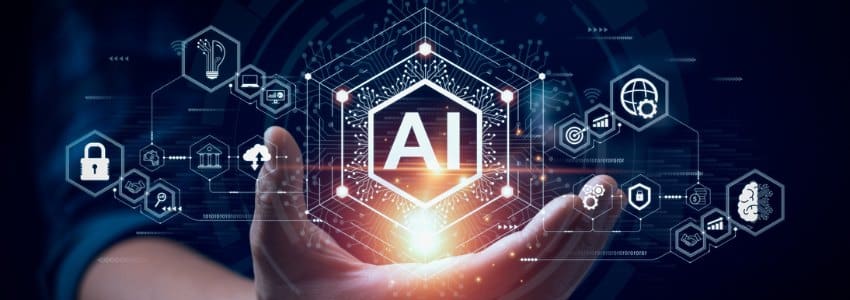How will AI impact the Human Resources function?
Last Updated on August 1, 2023 / HR Strategy

The rise of artificial intelligence (AI) has sparked debate about its effect on a wide variety of industries and job roles—and the Human Resources function is one of them! Many have wondered if AI’s impact on HR will lead to a significant reduction or complete elimination of HR professionals. Surely, it’s not possible to take the “human” element out of “human resources.”
At Clark Schaefer Strategic HR (CSSHR), it’s our belief that while AI has the potential to streamline HR processes and provide more information to enhance decision-making, organizations will continue to need HR professionals who have a nuanced understanding of people to lead and manage their HR function. In fact, AI’s continued evolution actually provides HR leaders with a unique position to make a significant organizational impact in a few ways: by understanding, utilizing, and providing guidance within their organization.
How AI can impact HR and recruiting functions
In a world of labor shortages and an increased need for efficiency, many organizations are consistently looking for ways to do more with less. One way that AI can impact the HR function (or better yet, streamline the HR function) would be in the recruiting process. For example, advanced algorithms can swiftly analyze vast amounts of data and eliminate human bias in the initial stages of reviewing resumes. We’ve seen advances in areas such as writing job descriptions, suggesting interview questions, screening resumes, and analyzing hiring criteria. Some AI bots are even conducting initial screening interviews with candidates.
Because of AI’s ability to process and analyze large volumes of data rapidly, HR professionals can leverage AI-powered analytics tools to gain valuable insights into other HR areas such as employee engagement, performance, and overall organizational culture. By identifying patterns and trends, AI can assist HR professionals in making data-driven decisions that optimize recruitment strategies, training programs, and performance evaluations.
Whether AI is handling simple or complex tasks, the key in any HR situation is to empower HR professionals to utilize AI in ways that allow them to focus on more complex or nuanced issues, rather than taking the “human” element away.
Chatbots and ChatGPT have changed the game
AI chatbots are the latest game-changer to impact HR in the evolution of AI technology innovation. For example, some companies use AI chatbots to provide 24/7 support to employees, answering frequently asked questions and freeing HR professionals to focus on more strategic and interpersonal aspects of their roles.
While there are several versions of Chatbots available, the most recent emergence of ChatGPT, an open AI platform that interacts with users in a conversational way, has been highly notable. In addition to synthesizing content like a search engine, this technology also learns relationships between data elements and can reassemble responses in a meaningful way based on the prompt question. The output is as fast as doing an online search, yet the resulting data far exceeds the robustness and usefulness compared to many internet queries. This tool has the potential to significantly increase the efficiency of HR professionals and employees alike by gathering and synthesizing meaningful data.
According to the Microsoft Work Trend Index Annual Report, far more employees (70%) would choose to maximize the use of AI to lighten their workloads compared to 49% of people who are concerned about losing their jobs to AI. As the world of work moves forward with an increased focus on workplace efficiencies, some use of AI may be inevitable. Perhaps one thing that HR professionals can do to allay employees’ concerns is to identify the skills needed to manage and augment the AI and provide the training, development, and growth opportunities to help employees succeed in the technology transition.
Ethical, legal, and security concerns
While it has great potential, there are still limitations, risks, and lingering questions about the use of AI. It’s important to recognize that many times AI lacks a nuanced ability in analyzing data. A human being who can consider various contextual factors, use intuition, and integrate empathy is needed before making final decisions. There are also ethical implications, legal considerations, and security concerns that must all be addressed before companies can fully take advantage of the technology. We’re not quite ready to let AI replace human judgment.
Geoffrey Hinton, a pioneer of artificial intelligence, quit his position at Google so he could talk more openly about the risks and dangers of AI technology. According to Reuters, Hinton states his primary concern is that the technology could become too smart sooner than experts expected and create convincing false images and texts which would result in not being able to discern what is true. While this may sound like a risk far into the future, there are additional immediate concerns that need to be considered including:
- ChatGPT is currently based on internet information through 2021, so some recent happenings and facts are not reflected.
- The answers are based on internet information, so they are only as accurate as the data on the internet. The AI-technology does not have the ability to know what is true.
- AI systems use historical data, which raises concerns about potential biases. If AI were to take over HR departments entirely, the risk of perpetuating systemic biases could increase.
- There is the possibility of giving proprietary or personal information that the system may “learn” and repeat in another answer which could cause security and liability risks.
How HR leaders can guide AI adoption
Proactive HR leaders can provide guidance to their organization that can add clarity and peace of mind during a tumultuous time of change. Consider the following actions leaders can take to help frame the discussions and drive decisions in organizations:
- Understand where the organization is considering and/or could benefit from AI technology.
- Create a roadmap to define business uses and outcomes for AI technology with guardrails to limit risk.
- Identify the technology skills and resource gaps that need to be filled to effectively harness the AI options.
- Develop strategic principles and policies (considering security and accuracy) to aid in the evaluation of how/when to utilize different AI options.
HR Leaders can support and perform these types of activities rather than allow the technology to be introduced without intentional consideration. Helping organizational leaders to consider both the impact and risk of utilizing a framework and strategic actions will lead to more informed decisions.
It is clear that AI technology has the potential to revolutionize HR practices by automating and streamlining processes; however, it is our firm belief that it is highly unlikely for AI to entirely take over the HR department. The human element in HR—empathy, emotional intelligence, and nuanced judgment—remains indispensable for managing a diverse workforce. HR leaders who can maintain a balance between AI and human expertise will make the most significant impact. And, those organizations with leaders that prepare, provide guidance, and make sound decisions will gain a competitive edge and thrive in the AI-enabled future.
Special thank you to Becky Foster, Senior HR Business Strategist, for contributing to this Emerging Issues in HR.
Do you need help with developing your HR strategy and identifying the tools you need to get there? The experts at Clark Schaefer Strategic HR (CSSHR) are here for you! To learn more, visit our HR Strategy Services page or contact us.













